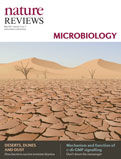|
| TABLE OF CONTENTS | |||||||||||||||||||||||||||||||||||||||||||||||
| May 2017 Volume 15 Number 5 | |||||||||||||||||||||||||||||||||||||||||||||||
| In this issue
| ||||||||||||||||||||||||||||||||||||||||||||||
| |||||||||||||||||||||||||||||||||||||||||||||||
 | |||||||||||||||||||||||||||||||||||||||||||||||
| Advertisement | |||||||||||||||||||||||||||||||||||||||||||||||
| |||||||||||||||||||||||||||||||||||||||||||||||
| Advertisement | |||||||||||||||||||||||||||||||||||||||||||||||
| |||||||||||||||||||||||||||||||||||||||||||||||
| |||||||||||||||||||||||||||||||||||||||||||||||
| NEWS AND ANALYSIS | Top | ||||||||||||||||||||||||||||||||||||||||||||||
| GENOME WATCH Evolve and survive Alena Pance p258 | doi:10.1038/nrmicro.2017.31 This month's Genome Watch explores how in vitro directed evolution can be used to identify the target of a drug for the treatment of Chagas disease, which is caused by Trypanosoma cruzi. | |||||||||||||||||||||||||||||||||||||||||||||||
| Advertisement | |||||||||||||||||||||||||||||||||||||||||||||||
| |||||||||||||||||||||||||||||||||||||||||||||||
| REVIEWS | Top | ||||||||||||||||||||||||||||||||||||||||||||||
The microbiota of the respiratory tract: gatekeeper to respiratory health Wing Ho Man, Wouter A.A. de Steenhuijsen Piters & Debby Bogaert p259 | doi:10.1038/nrmicro.2017.14 The respiratory tract spans from the nostrils to the lung alveoli and these distinct niches host a diverse microbiota. In this Review, Man, de Steenhuijsen Piters and Bogaert discuss the role of the respiratory microbiota in the maintenance of human health. Abstract | Full Text | PDF | |||||||||||||||||||||||||||||||||||||||||||||||
| Cyclic di-GMP: second messenger extraordinaire Urs Jenal, Alberto Reinders & Christian Lori p271 | doi:10.1038/nrmicro.2016.190 Cyclic dinucleotides are highly versatile signalling molecules that control important biological processes in bacteria, including motility, virulence, biofilm formation and cell cycle progression. In this Review, Jenal and colleagues discuss the molecular principles of cyclic di-GMP (c-di-GMP) synthesis and degradation, and the cellular functions that are exerted by c-di-GMP-binding effectors and their diverse targets. Abstract | Full Text | PDF | |||||||||||||||||||||||||||||||||||||||||||||||
| Xerotolerant bacteria: surviving through a dry spell Pedro H. Lebre, Pieter De Maayer & Don A. Cowan p285 | doi:10.1038/nrmicro.2017.16 Understanding the ecology and function of dry-adapted communities is important for understanding and preventing desertification. In this Review, Lebre, De Maayer and Cowan discuss the adaptations that enable xerotolerant bacteria to survive extreme dry conditions and highlight insights from recent metagenomic and transcriptomic studies. Abstract | Full Text | PDF | |||||||||||||||||||||||||||||||||||||||||||||||
| Virulence of the zoonotic agent of leptospirosis: still terra incognita? Mathieu Picardeau p297 | doi:10.1038/nrmicro.2017.5 Pathogenic leptospires are the bacterial agents of leptospirosis, which is an emerging zoonotic disease that affects both animals and humans worldwide. In this Review, the recent advances in our understanding of the epidemiology, taxonomy, genomics and the molecular basis of virulence in leptospires, and of how these properties contribute to the pathogenesis of leptospirosis, are discussed. Abstract | Full Text | PDF | |||||||||||||||||||||||||||||||||||||||||||||||
| PERSPECTIVES | Top | ||||||||||||||||||||||||||||||||||||||||||||||
| OPINION Microorganisms maintain crowding homeostasis Jonas van den Berg, Arnold J. Boersma & Bert Poolman p309 | doi:10.1038/nrmicro.2017.17 Macromolecular crowding affects the physicochemistry of the cytoplasm and, in turn, microbial physiology. We propose that cells maintain the overall concentration of macromolecules within a narrow range (a process that we refer to as 'homeocrowding') and discuss possible mechanisms for achieving this. Abstract | Full Text | PDF | Supplementary information | |||||||||||||||||||||||||||||||||||||||||||||||
| Advertisement | |||||||||||||||||||||||||||||||||||||||||||||||
| |||||||||||||||||||||||||||||||||||||||||||||||
| |||||||||||||||||||||||||||||||||||||||||||||||
You have been sent this Table of Contents Alert because you have opted in to receive it. You can change or discontinue your e-mail alerts at any time, by modifying your preferences on your nature.com account at: www.nature.com/myaccount For further technical assistance, please contact our registration department For print subscription enquiries, please contact our subscription department For other enquiries, please contact our feedback department Nature Publishing Group | One New York Plaza, Suite 4500 | New York | NY 10004-1562 | USA Nature Publishing Group's worldwide offices: Macmillan Publishers Limited is a company incorporated in England and Wales under company number 785998 and whose registered office is located at The Campus, 4 Crinan Street, London, N1 9XW. © 2017 Nature Publishing Group, a division of Macmillan Publishers Limited. All Rights Reserved. |
 |









No comments:
Post a Comment